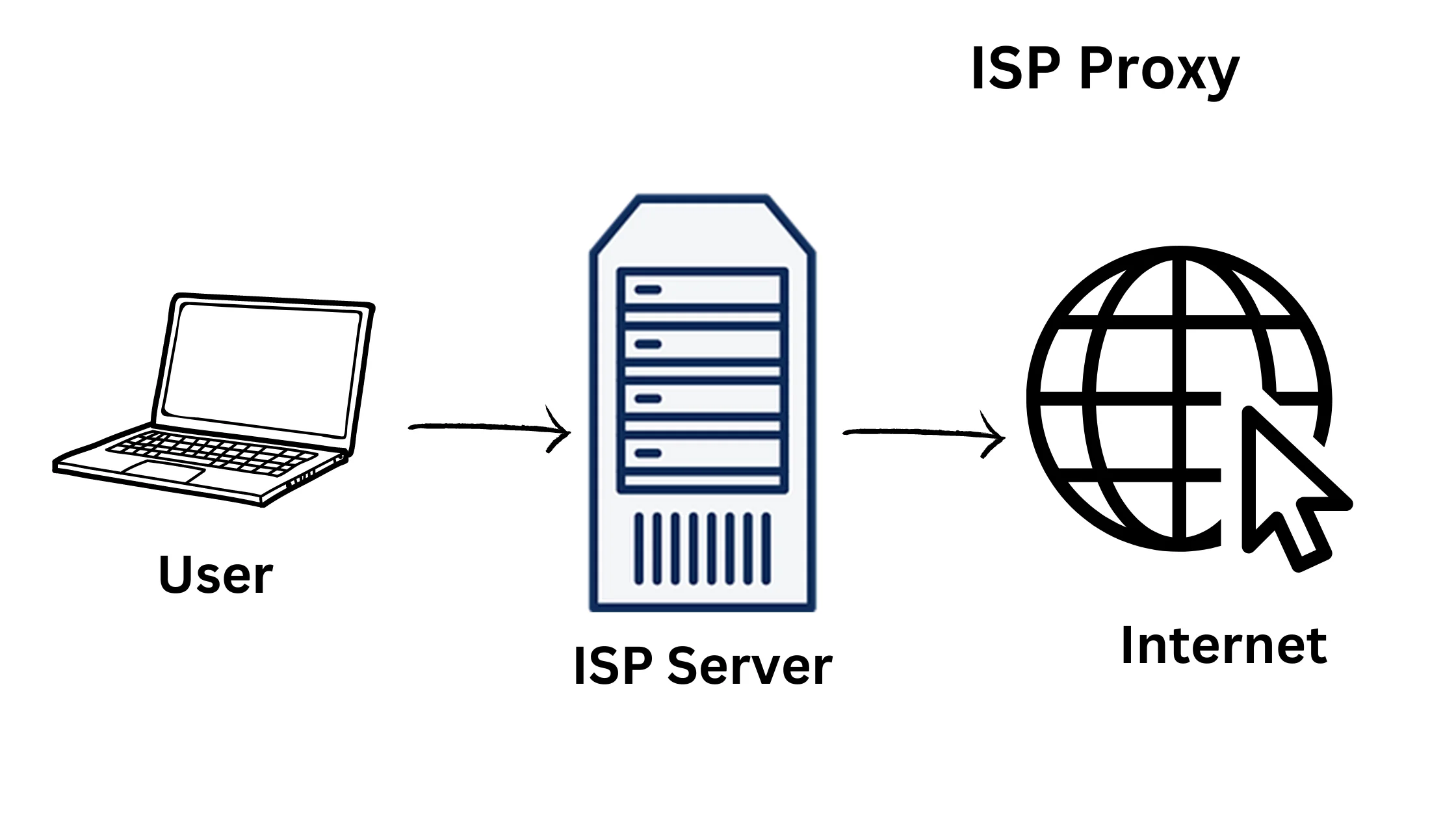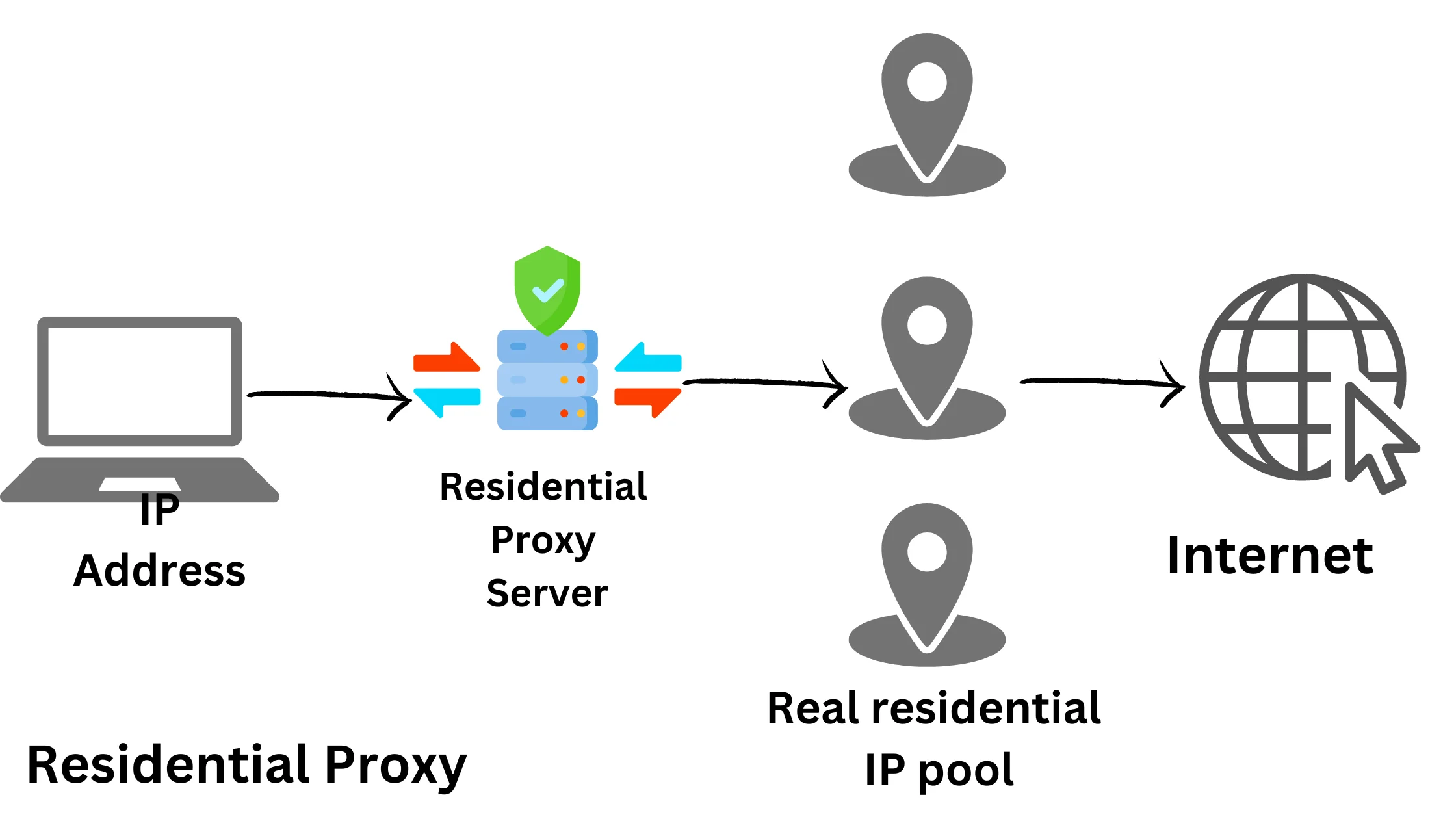Proxies are like helpers when you want to access stuff online from specific locations or do it without revealing your identity.
But not all proxies are equal. The main types are ISP Vs residential proxies, and they each have their own strengths.
In this quick guide, I’ll explain what these proxies are and how they’re different. I’ll also talk about when you might want to use each one. Let’s get started!
What Are ISP Proxies?

ISP proxies are basically datacenter proxies that are registered under internet service providers, or ISPs. Now, what are datacenter proxies?
Well, they’re IP addresses hosted on cloud servers by various hosting companies, and they’re not tied to a specific physical location like residential proxies are.
Because datacenter proxies are hosted on cloud servers, they offer really fast and stable connections compared to other types of proxies. So, if you want high-speed and anonymous browsing, you can count on datacenter or ISP proxies.
What Are Residential Proxies?

Residential proxies are like borrowing someone else’s internet connection. They use real IP addresses from people’s homes, making it hard for websites to know you’re using a proxy.
When you use residential proxies, a server changes your IP address, making it look like you’re browsing from a different location.
Because residential IPs are more genuine, they’re better for things like checking ads, gathering data from websites, or watching market trends.
| Provider | Number of IPs | Global Coverage | Starting Price/GB/mo | Free Trial | Additional Features |
| Bright Data | ISP: 72M+ | ISP: 49 | ISP: $9 / Residential: $6.3 | 7-day | City targeting, Extended session, Dedicated IPs, SOCKS5 protocol |
| Smartproxy | ISP: 10M+ | ISP: US-level | ISP:$14 / Residential: $12.5 | 3-day 100MB trial for $1 | HTTP(s) & SOCKS5 protocol, Static sessions |
| Oxylabs | ISP: 360K+ | ISP: 20 | ISP: $17 / Residential: $9 | 7-day | SOCKS5 protocol, Auto IP rotation, City & ZIP targeting |
| NetNut | ISP: 1M+ | ISP: 30+ | ISP: $17.5 / Residential: $15 | 7-day | Auto IP rotation, Dedicated IPs |
| IPRoyal | Residential: 2M+ | Residential: 195+ | ISP: $1.75 / Residential: $7 | N/A | City/state targeting, SOCKS5 support, Dedicated IPs |
| SOAX | Residential: 5M+ | Residential: 150+ countries | ISP:$16.5 / Residential: $12 | 3-day Trial for $1.99 | Support for HTTP(s) and SOCKS5 rotation for ISP proxies |
| Oxylabs | Residential: 100M+ | Residential: 195 | ISP:$17 / Residential: $15 | 7-day | Up to 5h extended sessions, HTTP/HTTPS/SOCKS protocols, Automatic prewrite, and make. |
How Does an ISP Proxy Work?
ISPs (Internet Service Providers) have a bunch of IP addresses that they can use as proxy addresses. When you try to connect to a website, your connection request goes through your ISP’s proxy server.
The proxy server then gives your device a new IP address. This new address is used to connect to the website, making it seem like you’re someone else.
These proxies are often cheap, and you can buy a lot of them at once. Since they use your ISP’s ASN (Autonomous System Number), they’re easily accepted by different websites and can get around security measures or gatekeepers.
How Does a Residential Proxy Work?
Both types of proxies change your IP address, but they do it differently. With datacenter or static residential IPs, you get a new virtual IP address from a big pool.
But with residential proxies, you’re using an IP address that’s really in someone’s home. So, when you connect, it looks like a regular person browsing.
It’s like lending your home’s address to someone else for a bit. And if you’ve given permission, someone else might also use your IP address as a proxy on their devices.
What Are the Benefits of ISP vs Residential Proxies?
| Benefits | ISP Proxies | Residential Proxies |
|---|---|---|
| Speed | Blazing fast due to powerful data centers | Speed can vary depending on the connection of the residential IP |
| Stability | Very stable network with minimal interruptions | Stable network with minimal downtime |
| Bandwidth | Unlimited data usage | Unlimited data usage |
| Anonymity | Identity protection due to lack of physical location | Flexible usage with real IP addresses |
| Blocking Risk | May be more prone to blocking by websites | Low risk of websites blocking proxies |
| Location Flexibility | Limited to specific locations | Access content specific to certain locations |
Use Cases of ISP Proxies
- Managing Multiple Accounts: If you have several social media or e-commerce accounts, using static residential proxies can help you access them all without raising any red flags.
- Buying Limited Edition Items: When purchasing a limited edition item in bulk on e-commerce sites, using static residential proxies can help you avoid suspicion and bypass any purchase limits.
- Web Scraping: Datacenter proxies are great for web scraping because they’re fast and reliable, making it easier to gather information from websites without worrying too much about being detected.
Use Cases of Residential Proxies
Let’s explore some common uses of residential proxies.
- Ad verification: Residential proxies make it easier for platforms to verify ads because they show you as being in a real location.
- Competitor monitoring: It’s important to stay updated with market trends by keeping an eye on your competitors. Residential proxies help you gather valuable information for this purpose.
- Business automation and social media management: You can use residential proxies to automate tasks in your business or efficiently manage your social media accounts.
| Factor | ISP Proxies | Residential Proxies |
| Definition | Use IP addresses provided directly by ISPs | Use IP addresses assigned to homeowners by ISPs |
| Source of IPs | Internet Service Providers | Internet Service Providers, but traffic is routed through residential devices |
| Rotating/Static | Static, but some providers offer rotating setup | Rotating |
| Speed | Usually faster | Medium |
| Advantages | Faster and lower chance of being blocked | High anonymity and more diverse IP pool |
| Stability | High | Can vary depending on the internet connection of the device |
| Ideal for | Tasks requiring high speed and reliability | Tasks requiring high anonymity and geo-targeting |
| Locations | Wide coverage | A broad global coverage |
| Price | Medium-high due to speed and direct sourcing from ISPs | Medium can vary depending on the provider |
Quick Links:
Conclusion
Before I wrap up, it’s important to remember that both ISP proxies and residential proxies serve different purposes based on your needs.
If you’re looking to browse the web anonymously at high speeds, static residential proxies offer greater convenience, stability, and speed.
However, if your goal is to bypass website security measures aimed at preventing bots, residential proxies might be a better choice.
